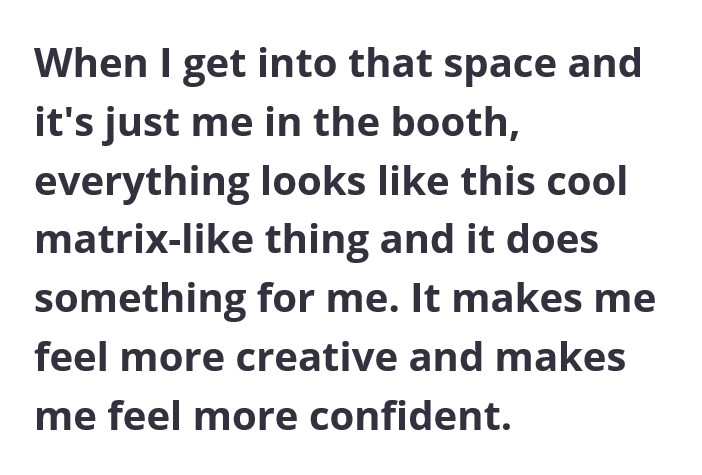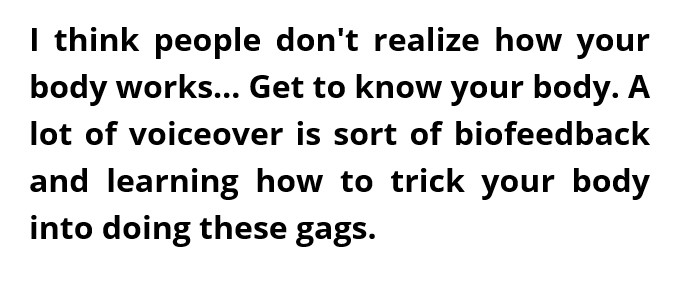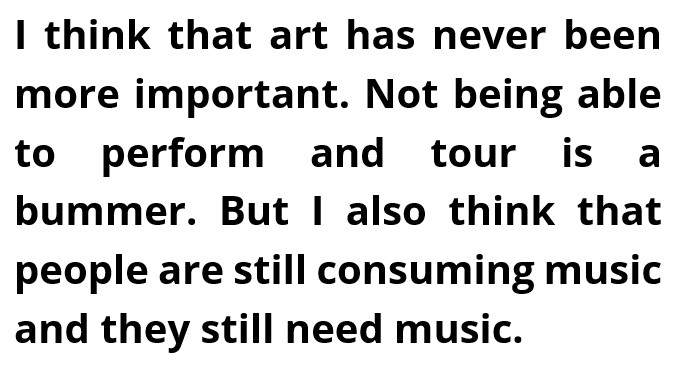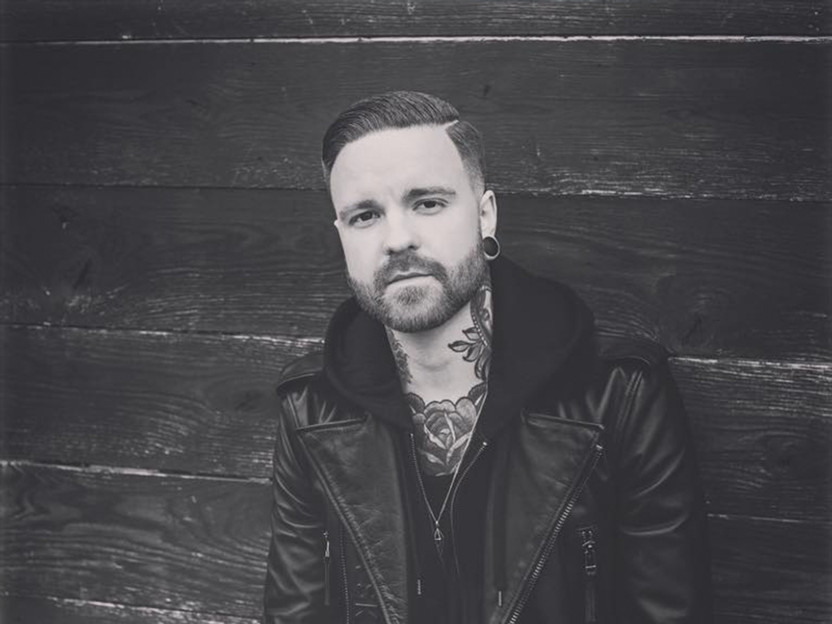What Does Matty Mullins Use in His Studio?
Posted by Auralex on 11th Aug 2020
Note: Interview has been edited for brevity and clarity. The interview was conducted by Kevin Booth, Auralex national sales manager. Robb Wenner, Auralex artist relations, produces the podcast and also jumps in with questions. To hear the interview, subscribe to Auralex Creative Spaces on your podcast platform of choice.
Kevin Booth: Can you tell us a little bit about yourself? You've probably told many interviewers how you got started in music, but how did you get started in the recording and the production side of music?
Matty Mullins: I was tired of traveling. We are on tour so much. And by “so much,” I mean SO much. Back in the earlier days, we had a couple of different years where we had done 300 dates. And I didn't want to be on tour all the time and be away from my wife and then go and spend two months in Vegas or LA or whatever, doing a record there, and literally never have any time home.
And so the idea for this room was, let me build out something that I can use just for vocals, a space where I can feel creative, a space where I can write, but also where I can get like really high-quality vocals. That was the idea behind this. I've been here for seven years and just recently started a new project, where I turned a closet into a new vocal booth. It turned out really cool. I'm sure we'll talk about that later.
KB: Let's talk about that space. It started out with just the room you're in, but you added a vocal booth recently?
MM: Yeah, Robb [Wenner, Auralex artist relations] came out and did the analysis. There is a wall, I wish I could turn my camera to show you, but there's the wall that the door is on. Just on the other side of it, there's a walk-in closet that I was using to store boxes, gearboxes or whatever, but it was decently wide and long. I was always like, ‘Man, this would be the greatest vocal booth room.’ If I just put in a window between this wall and that wall, and completely treated the closet, it would be a great space for a perfectly dead vocal that you can do everything you want to in post, right?

I had that idea for a couple years. Finally, I contacted Robb and was like, ‘Hey, this is my idea, what do you think? He came out to the house looked at and said this will work great. The rest is history. I did a lot of the work myself. I did all the treatment myself, but we ended up running XLR through all the walls and putting an XLR plate behind my desk here and another XLR plate in the booth. We didn't have to run cables every time we cut vocals. Putting in the window, I hired somebody to come and do that because it's kind of an extensive process.
It turned out really cool. If you go to my Instagram, you can watch kind of a step-by-step video of it. It turned out really great, man. We've been using it daily. It just sounds killer. The greatest thing about Auralex, in my opinion, obviously sound control is the goal, but the way it looks and even the way it smells, it feels creative. When I get into that space and it's just me in the booth, everything looks like this cool matrix-like thing and it does something for me. It makes me feel more creative and makes me feel more confident.
KB: So the idea in your booth is to have a really dead room so you can get the tight vocal sounds that you have. Those are layered vocals and you create the ambient around it, right?
MM: Absolutely. Yeah do everything in post. A lot of people are different. Some people like to track with hardwood floors beneath them, they like a little shine from the floors, natural reverb or whatever, but I want to be able to completely control an isolated vocal in post. Or whoever's mixing, I always prefer to give a completely dead vocal especially because if you listen to the Memphis May Fire stuff, you'll notice like a lot of the vocals are like heavily affected. We've got low pass like on all these intertwining parts and there's a little bit of distortion on some screams and there's a lot of reverbs and delays on the top line. So it needs to be dry, it needs to be dead.
KB: If you have an ambient already recorded in there, you can't take it out and to do those things, it would be impossible or really hard, right?
MM: Yeah. I would go with impossible. Yes.
KB: What have you been recording? You mentioned you're working on some stuff recently. What have you been recording in that space?
MM: I have two different projects, I have the band and then I also do a CCM-style solo project. Working on both, but mainly the new Memphis May Fire record. We just signed a new record deal for two more albums, so we're currently writing the first of the two.
It's been so awesome to be like, Alright, well, I'm going to go in. I just wrote this, I'm going to cut this vocal. And if it sticks, it sticks. If it doesn't, still sounds great. But if it does stick, then I have just completely controlled and edited everything, this vocal, myself.
Another thing I want to mention is the standard screen-sharing app that comes with every Mac. You can share your screen with another computer. You can also control your screen with another computer. This is probably something that everybody knows. I didn't know. I just figured this out. I've got a Mac Mini in the studio that I run in here, I can bring my laptop into the vocal booth, put it on a music stand, and I can screen share and I can literally control…you don't even have to use Logic Remote, it has less options. I can see a full screen of everything. I've got my console, I've got Logic and everything right there on my laptop. I'm controlling it, I come back in here and it's just boom, it's right there. It's like ready to go. It's insane. I can literally engineer the entire album myself if I wanted to.
KB: Is it easier for you to do vocals on your own without an engineer? With you in your own head and your own space?
MM: There's pros and cons to both. For me, a lot of times what I might be insecure about, or what I might not love about a vocal take, a producer will really like because it adds character. I find that when I cut my own vocals, I'm usually going and going until I have this perfect, shiny take, and then I've lost emotion, if that makes sense? I think that for the most part, I can do it. I'm getting better at trusting what I naturally do. But I have a couple different engineers I work with that I really love, that are very encouraging. They're not Yes Men, but they help and coach and guide and it's awesome. I think a pro is that when there's no one around or when you can't get ahold of somebody or when schedules are busy or when there's a virus that's taking over the world and people don't want to go into your house, you can literally pop in and screen-share and you can do everything yourself. So, it's great.
KB: And the gear side of things, you use Logic predominantly?

MM: Yeah, super simple setup in here. You know I've got the Apollo Twin Duo and I run Logic. We're not tracking drums in here, so it’s not anything too crazy. But I love the Apollo, I love using Logic, it's extremely user-friendly and has always been good to me. For vocals, I use a Telefunken AK-47 MKII. I use all Telefunken live. They are M80 capsules on my wireless [mic]. It's mind-blowing what that capsule has done for my entire mix. Just using that capsule, I felt for the first time ever, my vocal was separated to the point where I could really pick it out of the mix of craziness that's going on. It's like if you can imagine like a heavy metal mix and all the different parts going on and guitar parts are all over the place, bass and drums. To be able to really feel like you can hear your vocal crystal-clear amongst the chaos, it's a game changer, not only for the mix, but also for my voice because I feel like I don't have to sing as hard to hear myself. So yeah, that capsule is incredible.
KB: And then you're not injuring your voice, right.
MM: Right. Right. Right. But you know, who knows if we'll ever play live again. So... [laughs]
KB: Yeah, I saw a bluegrass performance a couple weeks ago. It's just great to see live music again. But everybody was six feet away from each other on golf carts actually. That might be where we’re headed.
MM: Yeah, I mean, I think that the drive-in type shows that have been happening are cool. I don't think that would be conducive with hard rock. Unless everybody turned their windshield wipers on at the same time or like flash their headlights, you know? [laughs]
Robb Wenner: You do some cool stuff production-wise with the vocals. Are there any kinds of software that you use for that?
MM: You know what’s been really impressive, honestly, is the new Joey Sturgis plugin, it’s the Howard Benson vocal. It is so much fun to play with, you can do anything vocally in that one plugin, from start to finish. Take a dry vocal and use that one plugin, compression, everything, it's crazy. I'm still pretty new to it but for anybody that hasn't checked out that specific -gain reduction is a cool plugin as well - but that specific Howard Benson vocal plugin from JST [Joey Sturgis Tones] is next-level. I've never used anything like it.
KB: Do you do any mixing in the room there?
MM: I put out a solo album called “Unstoppable.” That entire album was tracked, mixed and mastered in this room. Start to finish and sounds great.
I don't personally do any mixing. But we have done that. There will be a new thing that came out that was recorded and mixed, everything in here as well.
I live in a suburb called Spring Hill, Tennessee. It's a suburb of Nashville. But we're a good bit south. We're about 40 minutes south of the city. And it's never been a cool place to live. It's like Suburbia. There's a McDonald and a Walmart and whatever. When my wife and I were living in Seattle, we moved here because we just searched my sister's ZIP code and just wanted to find something around her. She lived in Franklin. So we ended up here. And there was nothing going on here.
And then all of a sudden, people started flooding in Nashville. Everyone's moving further south. And Spring Hill is becoming a thing that's kind of cool. But my friends and I, we go kayaking and we all do funny stuff. We wear crocs and socks and it's like a whole thing. We made a song about this life that we live in Spring Hill, Tennessee, and it's called “South on 65.” And it's like a like a country rock or whatever. It turned out so hilarious and good that we shot a full-blown music video for it. There's a little dive bar out here in Spring Hill called Froggy and Jeffro’s. We actually shot all the live performance in the bar. We went kayaking on the Duck River. That was done in this room, as well. It's actually in the music video, you can see us in here working on it.
KB: Yeah, I can relate that sounds like my weekend fun, crocs and socks and kayaks.
MM: We're having the greatest time. Now one of my best friends bought the house directly across the street from me. So we hang out every day and we're big Spring Hill fans.
KB: The single Memphis May Fire put out a few years ago in 2017, “Virus,” does that song have a new meaning to you now that it didn’t then?
MM: Obviously it's a metaphorical virus in the song, just talking about whatever it is in your life that might be poisonous that you need to rid yourself of to be able to move on and grow and become the best version of yourself possible. As soon as the news even like started talking about it, we got tagged and all this stuff on the internet like “Oh, man, they were right all along. “Yeah, “Virus” was a fun one. That music video was really fun, too. I got to kill a zombie.
KB: Yeah, that's a great song. And it's what you were saying that the music you've created there [in the home studio], it stands up. It's not real different from the other music you have, it isn’t like “Oh, well, that was done in this house clearly,” you know.
MM: No way, man. Everybody's working in the box these days. But what does help is having a well-treated room. I know Rob really liked the way that I treated the room. And having a creative space that feels separate from the rest of the house, it really feels like when I step into this room, I'm stepping into a different place, having a booth and just it just feels good. And it sounds good. And that is so important.

KB: Some of the studio work I did with a friend, we had a studio and we were always concerned about that first perception when you walked into the room, you had to walk into a completely different space. Not a dirty space, not a spaghetti factory filled with piles of wires, a neat clean space that's kind of open that you could walk into and bring your stuff along and put it down and not feel like you're cluttered.
MM: When I was in Orlando six or seven months ago, I decided to swing by Elvis Baskette’s studio. I've always been a huge fan of his work. But there's not a whole lot of pictures and videos of his studio that float around. And just walking into that space, man, I've never felt so at home instantly. His space is insane. But just the vibe that he's created in there, it makes you feel when you come in, you're like, “Alright, I want to do a record here.” I could spend two months in this room, all day, every day, and feel amazing about it. And I wanted to create something, you know, obviously on a smaller scale, but something like that here, where I would want to be all the time. Even if I'm not recording or writing, I'm in here usually as an office as well, just working on whatever. So it's great.
KB: We've talked about it a little bit, but is there anything in particular about how COVID-19 has really changed the way you work, or changed your outlook on music, the future, releasing content?
MM: I think that art has never been more important. Not being able to perform and tour is a bummer. But I also think that people are still consuming music and they still need music. People will always need music, especially in a time like this, when you feel isolated, when you feel alone, when you feel confused, when you feel sad, you need a song to remind you that you're not alone, remind you that you're human, to say like, “Oh, there's someone else that's experiencing these same emotions” and that's why music is so powerful.
I think that people's attention spans are probably a little shorter these days, because artists are releasing music a little bit faster so that you can kind of be like, “Alright, this is my favorite record.” And then tomorrow, a new record comes out and “Oh this is my favorite record.” I think that it might be important to be releasing music faster than ever before, from an artist's perspective, especially because we can't tour.
I was on a podcast last week, and they asked, “Do you think that music and art still matter as much?” Yeah, I think it matters even more now. And I think people are consuming it at a rapid rate. So as long as we can be creative with how we're presenting our music to whoever chooses to listen to it, I think that there still is very much a market for this forever.
KB: Years ago, in the beginning of rock or whatever it was, or pop music, it was releasing singles, right? So you release singles, you didn't tour as much, but release singles and maybe that's part of it...
MM: I think so. Instead of dropping an album, why not just drop a song a month for 12 months? Just always kind of grabbing people's attention. I think that hip hop's been doing that for a while now, too. And it just seems like a smarter way to make sure that everything you create gets eyes on it.
Because these days, we'll put out a record and you can't even go to radio with more than three songs for an album cycle. It's like you go to radio. And then there's awhile before you're on the charts, a couple months, and then you get on the charts and you're working your way up to the top for a couple months, and then you get up to the top and then now you've had the song in the Top 10. And now it has a longevity of eight to 10 more months, just like with a lot of spins. So you're a year in with only one single having gone to radio and then all of a sudden, you do it again. And then it's time to do a new record.
You've got eight or nine or 10 other songs that never had any attention because they weren't on a Spotify playlist or on a station. So I think that putting out singles is probably going to be the way of the future.
KB: I think at some point we'll get past this, and there will be new energy to see art and creativity and live music.
MM: Absolutely. People won't take it for granted. I also think there's two sides of that, I think that the market could be flooded. I think everyone who hasn't been on tour is all going to tour again at the same time, so like literally every venue is booked. So you could walk out your front door and there's someone playing on their porch. I think it'll be a pretty crazy time when they say, All Systems Go.

RW: As far as collaborating with the rest of the people in the band, how does this change that? Were you already doing kind of remote collaboration?
MM: Luckily for us, our entire career, Kellen [McGregor, lead guitarist] and I have never written together in the same room ever. There's only two writers in the band. He's always written everything instrumentally and I've always written everything for topline. For the last 11 years, I have just been getting a demo from him and writing vocals over it. If we needed to change something instrumentally to cater to the vocal, then we will, but this is how we've always done it. So it hasn't been an issue.
KB: Where’s the rest of the band located roughly? All in the Tennessee area?
MM: All of us, except our drummer, who lives in Orlando. We're just a four-piece at this point. Me, Kellen and Corey are all here, but we're in very different areas. I'm in Spring Hill Kellen’s in Brentwood and Cory lives on a horse farm in north Nashville. We're pretty spread out, but we see each other a good bit.
KB: So Matty, is there anything about you that we wouldn’t know or expect?
MM: I’m a big barbecue guy. Pretty heavily into that.
KB: What kind of grill? A pellet grill?
MM: I have a lot of pellet grills. I have six Traeger grills. They’re all smokers, but with the new Pro series, all their 2019 and 2020 models, they go to 500 degrees. I’ve gotten ridiculously into that. Next month, Traeger is flying me for a fishing trip. They’re shipping two grills down there, and I’m going out on this half-yacht, fish for swordfish, catch one, we’re going to cook it and eat it out at sea and do a video of the whole thing.
KB: I think we already covered this, but is there anything that you would like promote, any upcoming projects? A Memphis May Fire album is there a due date or a release date on a new song? Or just watch for it in the future and anything else that you have going on?
MM: Not even close. We're just very much at the beginning stages of writing. And we’ll decide where to go from there. I think it'll be a while. It'll be probably a year before a new Memphis record would have come out. Who knows? We might drop a single before then. But there's no talks of that yet. It's all brand new. We literally just signed this new record deal.
But in the meantime, you can listen to “South on 65.” I've got a solo project for CCM radio and my single’s currently at radio, it's called “No Hold on Me,” probably already heard it at the beginning of this. If you listen to Christian contemporary radio, I think you'll love it. I'm really excited about that project.
KB: Matty, just to keep up on you and what you're doing, how should people follow you? Through Instagram? Facebook? What’s the best platform?
MM: Pretty much anywhere on the internet you can find me, other than TikTok. I don't do any of that. But you can find me on Facebook, on Instagram. Just search “Matty Mullins” and you'll find it.
KB: Well, thanks for being with us, man. It was great talking to you, all the best. You stay in touch. Happy to have you on the podcast and in the Auralex family.
MM: Thank you so much, guys. Very honored.
The Gear of Matty Mullins
SubDude-HT Subwoofer Isolation Pad
ProPAD Studio Monitor Isolation Pads
Telefunken AK-47 MKII Microphone


